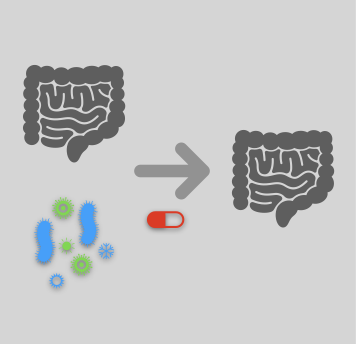Evidence of efficacy of Fecal Microbiome Transplantation

The fecal microbiome transplantation (FMT) transfers the solution of feces from a healthy donor into the gastrointestinal tract of a diseased person to restore the balance of microbiota in the recipient’s intestines and confer a health benefit. FMT shifts the intestinal microbial population to a healthier side and thus decreasing the attachment sites for pathogenic bacteria. Enema, colonoscopy, nasogastric tube, or oral capsules are usual means to administer FMT. A large body of evidence exists to demonstrate the efficacy of FMT in Clostridium difficile infection and other disorders. Published and known evidence of the effectiveness of FMT includes in-vivo human and animals as well as in-vitro models.
Clinical trials in human
In vivo evidence covers the human-based case reports, clinical trials, meta-analyses reporting the efficacy of FMT in various conditions. For example, a clinical trial on the effectiveness of FMT to treat Cl. difficile infection in 335 pediatric patients showed promising results in 81% of subjects. In this trial, 4.7% of patients experienced severe side effects that included hospitalizations as well. Another example of clinical trials consists of a study of the efficacy of FMT in 165 adult patients with irritable bowel syndrome. The intestinal microbial populations improved significantly with FMT treatment in these patients. Overall, 89.1% of the patients showed positive responses to FMT, with a few cases with gastrointestinal adverse reactions.
Efficacy in animal models
While a handful of studies demonstrate efficacy in human subjects, numerous studies show efficacy in the mouse models. Using different mouse models efficacy of microbiome transplantation has been shown in the maintenance or treatment of Clostridium Difficile infection, inflammatory bowel diseases, irritable bowel syndrome, metabolic disorder like obesity, cancer, anorexia nervosa, food allergies, and neurological disorders. FMT clinical trials in humans are at various stages for some of the diseases mentioned above, where efficacy is shown in animal models.
In vitro studies
Evidence of efficacy of FMT also comes from in-vitro studies. An example of such a study includes a human colon model-based study (HCModel). Experiments in HCModel showed that specific bacteriophage ΦCD27 reduces the burden of C. difficile infection and toxins.
Conclusion
The practice of FMT has been used for a long time to treat various gastrointestinal conditions. Only recently, it has been used effectively to cure multiple other diseases in a controlled manner. Several human trials proved its efficacy through well-designed clinical trials and in-vitro experiments, as well as in-silico studies. This modern version of the ancient technique is the gateway to the new era in medicine, where it will soon replace antibiotic therapies with this modern microbial transplantation technique. However, there is a pressing need to compile evidence from various sources and evaluate them using evidence-based medicine principles.
References:
Gupta, S., Allen-Vercoe, E., & Petrof, E. O. (2016). Fecal microbiota transplantation: in perspective. Therapeutic advances in gastroenterology, 9(2), 229-239.
Nicholson, M. R., Mitchell, P. D., Alexander, E., Ballal, S., Bartlett, M., Becker, P., ... & Kahn, S. A. (2020). Efficacy of fecal microbiota transplantation for Clostridium difficile infection in children. Clinical Gastroenterology and Hepatology, 18(3), 612-619.
El-Salhy, M., Hatlebakk, J. G., Gilja, O. H., Kristoffersen, A. B., & Hausken, T. (2020). Efficacy of faecal microbiota transplantation for patients with irritable bowel syndrome in a randomised, double-blind, placebo-controlled study. Gut, 69(5), 859-867.
Meader, E., Mayer, M. J., Steverding, D., Carding, S. R., & Narbad, A. (2013). Evaluation of bacteriophage therapy to control Clostridium difficile and toxin production in an in vitro human colon model system. Anaerobe, 22, 25-30.
Segal, J. P., Mullish, B. H., Quraishi, M. N., Iqbal, T., Marchesi, J. R., & Sokol, H. (2020). Mechanisms underpinning the efficacy of faecal microbiota transplantation in treating gastrointestinal disease. Therapeutic advances in gastroenterology, 13, 1756284820946904.
Bokoliya, S. C., Dorsett Y., Panier H, Zhou Y (2021) Procedures for Fecal Microbiota Transplantation in Murine Microbiome Studies. Front Cell Infect Microbiol 2021, 11, 711055.